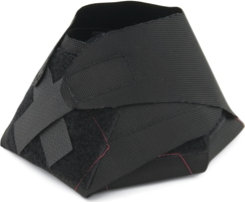I understand these products to be safe, and either control flies through inhibiting development of larvae or immature flies into adult flies, or using chemicals or natural foods (such as garlic or yeast) to repel flies. I don’t think I will ever use any of these products, although if I did I would be inclined to try the commercially available products that uses natural substances like garlic which repel flies and provide some beneficial nutrients to the horse.
Instead I control flies mainly through a manure management program and treating manure that is stored prior to a weekly removal. This year I may try to use fly predators just to see if they work. Fly predators are tiny insects that are the natural enemy of flies but do not bother people or livestock.
Fly sticks, strips or tape and fly traps (smells like hell when filled up with flies) are also effective but are a pain in the butt to use. Here's a tip: one benefit to using fly traps is that when they get filled up, you can place them underneath the back seat of your buddy's pickup truck.
I have found out that effective manure management is the primary best method to control flies. Manure attracts flies and also provides a breeding ground for them as well as for parasites like worms and mosquitoes. Not only important for West Nile Virus heavy areas, but also for dry and desert environs, manure has got to be removed and treated if stored for very long before removal. I have a large dumpster that we dump manure into, which is removed weekly. During the late Spring, Summer and early Fall months, I spray a insect killer onto the top of the manure stored in the dumpster to ensure a hostile environment for any breeding insects.
Fly masks, fly sheets and of course fly spray are all very useful especially for the thin haired and older horses. The most effective fly sprays use chemicals such as pyrethrins. I’m pretty careful how often I use it and where I spray it on the horse as this is a pretty potent chemical. I typically use several brands, mostly Tri-Tec 14 Spray, Pyranha Wipe and Spray and Repel-X RTU all of which are at the lower end of the price spectrum but still much more effective than the very low end fly spray such as Bronco. I would be comfortable using Ultra Shield or Wipe products as well.
I actually use a shot of two of Wild Turkey to keep the flies off me, but everyone knows horses only drink beer,...so Leticia, you can try feed through fly control. I won’t use it but understand it is safe. I have tried garlic powder mixed into my horse’s grain but they won’t eat it. Some of the feed through products are comprised of garlic and garlic and yeast. I would consider fly masks and even a fly sheet, plus maybe fly strips or traps and/or fly predators (I’ll test them this summer), but above all, a good manure management program is probably best. Good luck and a safe, fly less, journey.


















Tried fly predators...what a waste of money! Should have spent it on fly spray.
ReplyDelete